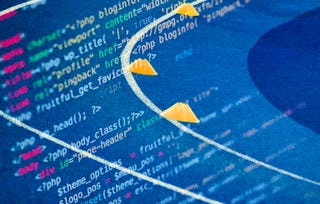This course provides an introduction to using Python to analyze team performance in sports. Learners will discover a variety of techniques that can be used to represent sports data and how to extract narratives based on these analytical techniques. The main focus of the introduction will be on the use of regression analysis to analyze team and player performance data, using examples drawn from the National Football League (NFL), the National Basketball Association (NBA), the National Hockey League (NHL), the English Premier LEague (EPL, soccer) and the Indian Premier League (IPL, cricket).

Foundations of Sports Analytics: Data, Representation, and Models in Sports
Seize the savings! Get 40% off 3 months of Coursera Plus and full access to thousands of courses.

Foundations of Sports Analytics: Data, Representation, and Models in Sports
This course is part of Sports Performance Analytics Specialization


Instructors: Wenche Wang
28,277 already enrolled
Included with
204 reviews
Recommended experience
What you'll learn
Use Python to analyze team performance in sports.
Become a producer of sports analytics rather than a consumer.
Skills you'll gain
Tools you'll learn
Details to know

Add to your LinkedIn profile
13 assignments
See how employees at top companies are mastering in-demand skills

Build your subject-matter expertise
- Learn new concepts from industry experts
- Gain a foundational understanding of a subject or tool
- Develop job-relevant skills with hands-on projects
- Earn a shareable career certificate

There are 6 modules in this course
Earn a career certificate
Add this credential to your LinkedIn profile, resume, or CV. Share it on social media and in your performance review.
Instructors


Offered by
Explore more from Data Analysis
 Status: Free Trial
Status: Free TrialUniversity of Michigan
 Status: Free Trial
Status: Free TrialUniversity of Michigan
 Status: Free Trial
Status: Free TrialUniversity of Michigan
 Status: Free Trial
Status: Free TrialThe State University of New York
Why people choose Coursera for their career

Felipe M.

Jennifer J.

Larry W.

Chaitanya A.
Learner reviews
- 5 stars
64.39%
- 4 stars
24.87%
- 3 stars
3.90%
- 2 stars
2.92%
- 1 star
3.90%
Showing 3 of 204
Reviewed on Jul 11, 2025
Thorough and with lots of practice to help retain information.
Reviewed on Aug 26, 2021
Great course. Although this course focuses on sports analysis, the analyzing process I learned from it can apply to any other areas of analysis.
Reviewed on Aug 27, 2022
Excellent course on how data analytics can be used in the world of sports.

Open new doors with Coursera Plus
Unlimited access to 10,000+ world-class courses, hands-on projects, and job-ready certificate programs - all included in your subscription
Advance your career with an online degree
Earn a degree from world-class universities - 100% online
Join over 3,400 global companies that choose Coursera for Business
Upskill your employees to excel in the digital economy

